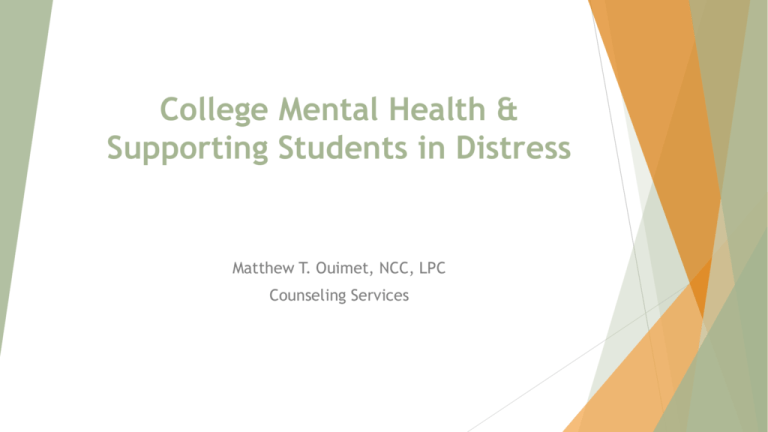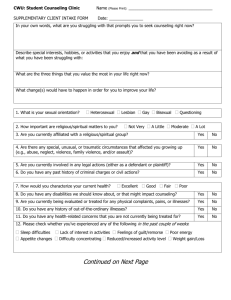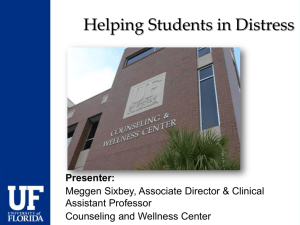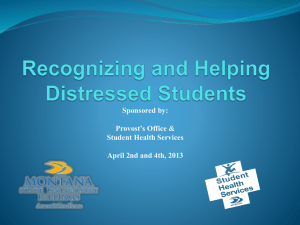Students In Distress Presentation
advertisement

College Mental Health & Supporting Students in Distress Matthew T. Ouimet, NCC, LPC Counseling Services Overview Introductions What is mental health? What causes mental health conditions? College students and mental health Understanding the millennial student Your role as a faculty or staff member How to help Resources to help you What is mental health? “Mental health includes our emotional, psychological, and social well-being. It affects how we think, feel, and act. It also helps determine how we handle stress, relate to others, and make choices. Mental health is important at every stage of life, from childhood and adolescence through adulthood.” - MentalHealth.Gov What causes mental health conditions? Over the course of your life, if you experience mental health problems, your thinking, mood, and behavior could be affected. Many factors contribute to mental health problems, including: Biological factors, such as genes or brain chemistry Environmental factors and life experiences, such as trauma or abuse Family history of mental health problems MentalHealth.Gov College stressors that can impact mental health Relationship breakups Body image concerns Homesickness Drug and alcohol use Peer Pressure Poor diet and lack of exercise Loneliness Sexual identity Academic pressure Hazing Future career stress Financial issues Bullying Veteran status Lack of sleep Taking on too much Death Over-involved Divorce Mental Health Does Matter: Prevalence on College Campuses Colleges across the country have reported large increases in enrollment [or at least increasing access for students]. At the same time, college counseling centers have also observed an increase in the prevalence and severity of mental health issues experienced by students and an increase in the number of students taking psychotropic medications. NAMI: National Alliance on Mental Illness Mental Health Does Matter: Prevalence on College Campuses 75% of lifetime cases of mental health conditions begin by age 24. 1 out of 4 young adults between the ages of 18 and 24 have a diagnosable mental illness. (8,500 X .25 = 2,125 undergrads at SCSU) More than 11 % of college students have been diagnosed or treated for anxiety in the past year. More than 10 % reported being diagnosed or treated for depression. Mental Health Does Matter: Prevalence on College Campuses More than 40 % of college students have felt more than an average amount of stress within the past 12 months. More than 80 % of college students felt overwhelmed by all they had to do in the past year and… 45 % have felt things were hopeless. Almost 73 % of students living with a mental health condition experienced a mental health crisis on campus. Yet, 34.2 % reported that their college did not know about their crisis. http://www2.nami.org/Content/NavigationMenu/Find_Support/NAMI_on_Campus1/Learn_About_The_Issue/Learn_About_The_Issue.htm Mental Health and Academic Success 64 percent of young adults who are no longer in college are not attending college because of a mental health related reason. Depression, bipolar disorder and posttraumatic stress disorder are the primary diagnoses of these young adults. 31 percent of college students have felt so depressed in the past year that it was difficult to function and more than 50 percent have felt overwhelming anxiety, making it hard to succeed academically. The Millennial College Student Key Characteristics 1. Special- Rewards for participation 2. Sheltered- Highly structured, limited chances to fall (learn, cope) 3. Team Orientated- Works well in groups, socially active 4. Confident- high level of optimism, tech savvy 5. Pressured- High expectations, expect constant feedback 6. Achieving- Will challenge methods for grading and testing 7. Conventional- Respect for cultural differences Importance of Your Relationship with Your Students 1. Establish Rapport: You are on the “front lines” 2. Know the warning signs 3. Know when and how to refer Warning Signs: Mental Health Conditions Warning Signs: Mental Health Conditions Warning Signs: Suicide Suicide is a REAL risk Signs are there…now what? Trust your instincts Use direct communication Remember that you are not alone Breathe Talking with students: Some suggestions Speak with the student in a private setting when you will not be rushed. If you have initiated the contact express your concern in behavioral, nonjudgmental terms. Use “I” statements. Be a good listener. Do not make judgments, evaluate or criticize the student even if the student asks for your opinion. Do not dismiss the seriousness of the problem. Maintain clear boundaries and expectations in your role as a faculty/staff member. Acknowledge the student’s state of distress & offer to help the student. Be compassionate and give hope. Let the student know help is available and you will help them find it. Talking with students: Some suggestions Give alternatives. Encourage the student to seek assistance through Counseling Services or other appropriate resources. You can offer to walk the student to our office (EN B 219) to set up the appointment or make the call with the student. In making referrals to someone who is reluctant, you can point out that getting help is a sign of strength and courage and that people seek help in a variety of ways (car repairs, medical concern, legal issues, etc). Know and express your own limitations. You are not expected to be a professional counselor. You serve an important role as a link to resources for the student. Call Counseling Services (392-5475) if you think the person is contemplating harming self or others if you are not sure what to do. Take all threats, hints and notes seriously. In cases of immediate emergency please call 9-1-1. Take care of you !!! Campus Resources: Consult Others if Needed It is often helpful to know on-campus resources before students are in distress Counseling Services Dean of Student Affairs/BIT Academic Dean DARC Women’s Center Judicial Affairs Residence Life Helping students in Distress Guidebook SCSU Home Page > Faculty/Staff > Resources Additional Resources QPR Training SCSU Student Handbook/Code of Conduct SCSU Helping Students in Distress MentalHealth.gov Voices4Hope.net Ulifeline.org National Institute of Mental Health StrengthofUs.org Online/Chat Resources for Students TheTrevorProject.org CrisisChat.net IMALIVE.net 24 Hour Hotlines 1-800-273-TALK 211 Quick Review: When to Refer (Counseling) In many cases of student distress, faculty and staff can provide adequate help through empathic listening, facilitating open discussion of problems, instilling hope, validating and normalizing concerns, conveying acceptance, giving reassurance, and offering basic advice. In some cases, however, students need professional help to overcome problems and to resume effective functioning. The following signs indicate a student may need counseling: • The student remains distressed following repeated attempts by you and others to be helpful. • The student becomes increasingly isolated, unkempt, irritable, or disconnected. • The student’s academic or social performance deteriorates. • The student’s behavior reflects increased hopelessness or helplessness. • You find yourself doing ongoing counseling rather than consultation or advising and feeling yourself pulled in directions that make you uncomfortable. • The student shows significant and marked changes in behavior and mood. SCSU Faculty and Staff Guide of Helping Students in Distress Note: Follow up on Referrals Counseling Services is a confidential resource, therefore following up on a student you referred for services can be tricky. Student can sign a release of information for us to communicate with you regarding attendance. If not, we are unable to confirm or deny the student has attended services. Recommendation: Follow up with the student directly. It shows that you care and that you want the best for them. Questions? Matthew Ouimet, NCC, LPC Phone:(203) 392-5482 Email: Ouimetm1@southernct.edu Thank you for Attending! Counseling Services Engleman B-219 Phone:(203) 392-5475 Remember to tell students: Free and Confidential!








